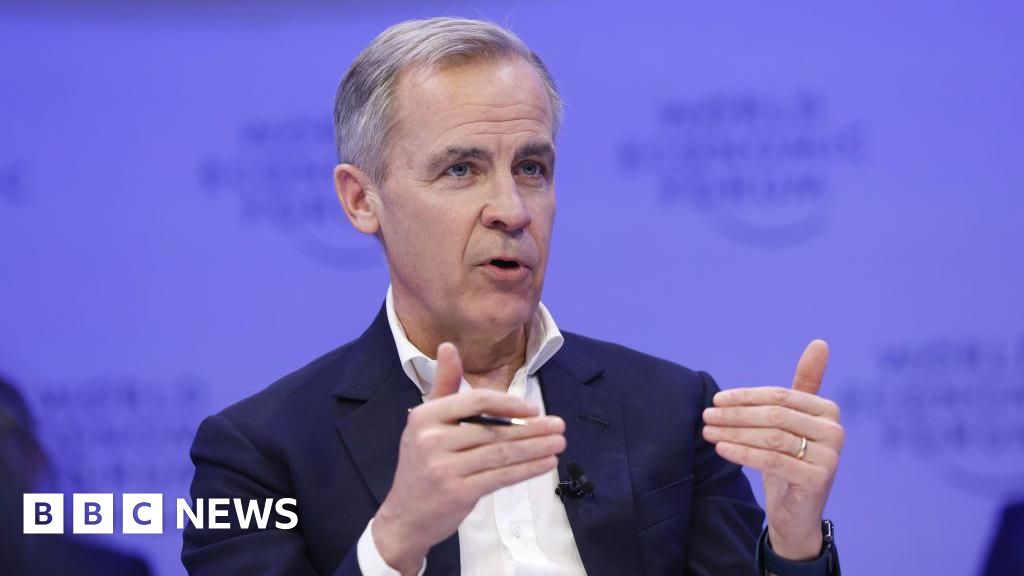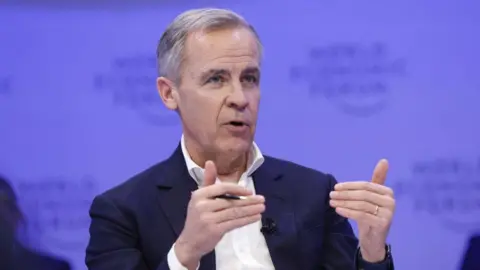Carney: Household bills will fall with new tech

By Tom Espiner, BBC business reporter
 Getty Images
Getty ImagesGreener technologies will help drive down household bills by the end of the decade, former Bank of England Governor Mark Carney has said.
By 2030, the cost of renewable energy will be lower, homes will be better insulated, and the cost of running electric vehicles will be lower, after an “initial investment cost”, he said.
Mr Carney said the new National Wealth Fund, recently announced by Labour, will attract investment in infrastructure and green industry.
But households will need to put money into technologies including such as heat pumps and electric vehicles to get the UK on track to meeting climate targets.
Under its £7.3bn National Wealth Fund, the new Labour government is to put money towards higher-risk projects, such as gigafatories for batteries, hydrogen fuel, carbon capture, and green steel.
It aims to attract £3 of private sector funding for every £1 of taxpayers’ money.
The private investment will build momentum if the projects are successful, Mr Carney told the BBC’s Today programme on Wednesday.
However, the Climate Change Committee has said that for the UK to get to net zero emissions by 2050 – that is, to completely off-set all carbon emissions – it needs to be investing £50bn per year by 2030.
This is quite substantially more than the amount of investment currently targeted by the National Wealth Fund.
Part of the cost will be taken on by the private sector, and investment will increase over time if green projects are successful, Mr Carney said.
He did caution, however, that some of this would be taken on by households.
“As we’re looking towards the end of the decade… you have better insulated homes, the cost of energy is lower, the cost of managing and running electric vehicles is lower,” Mr Carney said.
“So there’s an initial investment cost, but then the actual cost, the actual household bills that we pay, go down.”
Will the fund be successful?
The National Wealth Fund, which is part of the new government’s growth strategy, is a combination of two existing organisations: the UK Infrastructure Bank and the British Business Bank.
It will be overseen by a taskforce including Mr Carney, Barclays chief executive C.S Venkatakrishnan, Aviva boss Dame Amanda Blanc and large institutional investors.
The money from the government includes:
- £1.8bn to upgrade ports and build supply chains across the UK
- £1.5bn for new gigafactories
- £2.5bn for the steel industry
- £500m for green hydrogen
Simon French, chief economist at Panmure Gordon, said at the moment, the UK investment industry is “failing to fund some of the more high risk” energy projects.
But he said whether the new fund is successful or not will depend on whether it boosts infrastructure and technology in “genuine missing markets”, or whether it may “crowd out” private investors that would have put money in anyway.
And earlier this year, Labour made a major U-turn on its green investment plans, all but ditching its pledge to spend £28bn a year on energy projects such as off-shore wind farms and electric vehicle development.
Instead total extra investment compared to previous government plans would be about £4.7bn per year.
The move was criticised by left-wing campaign group Momentum and Unite, Labour’s biggest union backer.
In addition. the Green Party described it as a “massive backward step”.
Related
Why investing in women is a vital next step for…
Get Nadine White's Race Report newsletter for a fresh perspective on the week's newsGet our free newsletter from The Independent's Race CorrespondentGet our fre
Business secretary signals major shift on electric car policy to…
In a determined effort to retain Nissan’s manufacturing presence in Britain, Business Secretary Jonathan Reynolds has vowed to implement “substantial c
Joint Statement: Business Secretary and Fujitsu Services Ltd
Business and Trade Secretary Jonathan Reynolds today (Friday 7 March) met chiefs for Fujitsu in Tokyo to begin talks over the cost of redress for victims of th
UK foreign secretary backs multilateral defence funding for Europe
UK foreign secretary David Lammy has said that a new multilateral fund will be needed to secure Europe’s defence as he confirmed that Britain is “open to”













